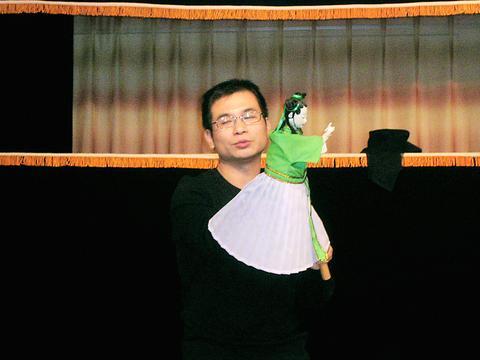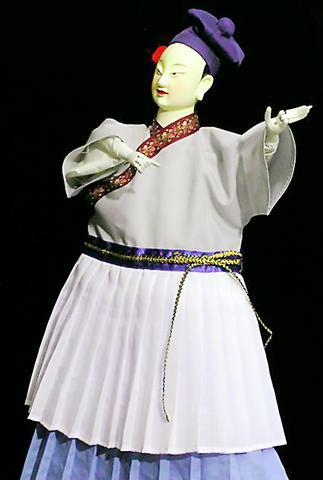This weekend, hopeless romantics can find a mini version of the poor-boy-meets-rich-girl at Crown Arts Theater Center, where The Happy Puppetry Company will put on the puppet version of a Taiwanese play whose name is now synonymous with marrying for love: Chen San Wu Niang.
Written in the early days of Taiwanese opera, Chen San Wu Niang tells the story of forbidden love. Chen San is a young man from a family of poor officials who falls in love with the fifth daughter of the wealthy Huang family, Wu Niang. To get closer to his beloved, Chen San enters the Huang court posing as a cleaner of mirrors. He intentionally breaks a mirror, and to compensate must become a slave of the Huang family. Unfortunately, he finds that Wu Niang is promised to the smarmy aristocrat Lin Dai (

PHOTO: MEREDITH DODGE, TAIPEI TIMES
According to director Ke Shi-hong (柯世宏), the theme of the triumph of love over tradition gives the story a modern edge. Perhaps Ke, whose grandmother founded the troupe, chose the play to fit his vision of a traditional puppet show -- with a up-to-date twist.

PHOTO COURTESY OF THE HAPPY PUPPETRY COMPANY
While the porcelain, cloth and wood puppets replace the flesh-and-blood humans that traditionally play the characters of Chen San Wu Niang, Ke has decided, in a few scenes, to replace the puppets with flesh-and-blood humans. The human actors do their part to mimic movements of their wooden counterparts as they sing, dance and spar with them. The result is endearing and comical.
"Hopefully, the modern style of this show will attract new audience members, especially the young folk," said Ke Jia-cai (

PHOTO COURTESY OF THE HAPPY PUPPETRY COMPANY
Another innovative aspect of the production is the musical accompaniment. It is not the fast-paced beiguan music traditional used in Taiwanese puppet theater, but rather the slower and more flowing nanguan music, provided by the SingSing Nanguan Company (
This, according to Ke, allows for more variety of movement with the puppets. And their movements are diverse indeed. As the puppets flow gracefully across the set, one can almost see the lightning-quick steps of their tiny, non existent feet. And while their porcelain lips do not move as they speak, the subtle cocking of the puppets chins can convey a surprising illusion of expression.
Both the songs and the dialogue are in Taiwanese, with Mandarin supertitles.
Performance notes:
What: Nanguan puppet theater: Chen San Wu Niang
(
Where: Crown Arts Theater Center, 50, Ln 120, Dunhua N Rd (皇冠藝文中心,敦化北路120巷50號).
When: Tonight at 7:30pm and tomorrow at 2:30pm and 7:30pm.
Tickets: NT$250
For more information, please go to www.artsticket.com, or call (02) 2993 1963.

On April 26, The Lancet published a letter from two doctors at Taichung-based China Medical University Hospital (CMUH) warning that “Taiwan’s Health Care System is on the Brink of Collapse.” The authors said that “Years of policy inaction and mismanagement of resources have led to the National Health Insurance system operating under unsustainable conditions.” The pushback was immediate. Errors in the paper were quickly identified and publicized, to discredit the authors (the hospital apologized). CNA reported that CMUH said the letter described Taiwan in 2021 as having 62 nurses per 10,000 people, when the correct number was 78 nurses per 10,000

May 5 to May 11 What started out as friction between Taiwanese students at Taichung First High School and a Japanese head cook escalated dramatically over the first two weeks of May 1927. It began on April 30 when the cook’s wife knew that lotus starch used in that night’s dinner had rat feces in it, but failed to inform staff until the meal was already prepared. The students believed that her silence was intentional, and filed a complaint. The school’s Japanese administrators sided with the cook’s family, dismissing the students as troublemakers and clamping down on their freedoms — with

As Donald Trump’s executive order in March led to the shuttering of Voice of America (VOA) — the global broadcaster whose roots date back to the fight against Nazi propaganda — he quickly attracted support from figures not used to aligning themselves with any US administration. Trump had ordered the US Agency for Global Media, the federal agency that funds VOA and other groups promoting independent journalism overseas, to be “eliminated to the maximum extent consistent with applicable law.” The decision suddenly halted programming in 49 languages to more than 425 million people. In Moscow, Margarita Simonyan, the hardline editor-in-chief of the

Six weeks before I embarked on a research mission in Kyoto, I was sitting alone at a bar counter in Melbourne. Next to me, a woman was bragging loudly to a friend: She, too, was heading to Kyoto, I quickly discerned. Except her trip was in four months. And she’d just pulled an all-nighter booking restaurant reservations. As I snooped on the conversation, I broke out in a sweat, panicking because I’d yet to secure a single table. Then I remembered: Eating well in Japan is absolutely not something to lose sleep over. It’s true that the best-known institutions book up faster